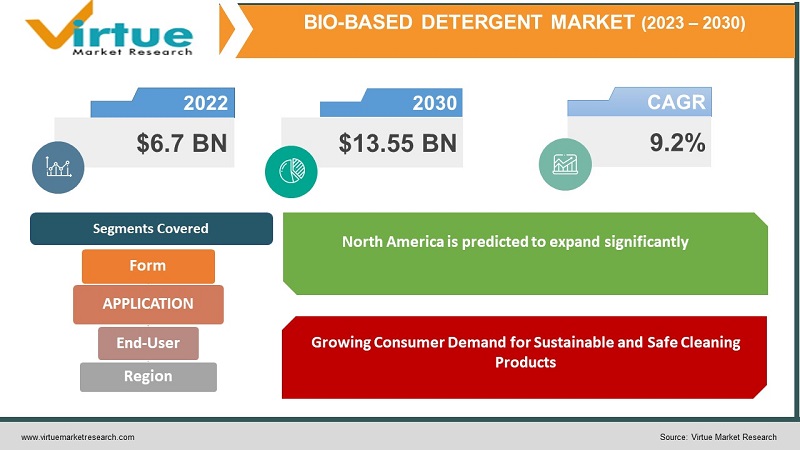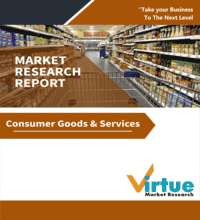Bio-based Detergent Market Size (2023 – 2030)
According to the latest analysis by virtue market research, the Global Bio-based Detergent Market was valued at USD 6.7 Billion and is projected to reach a market size of USD 13.55 Billion by the end of 2030. Over the forecast period of 2023-2030, the market is projected to grow at a CAGR of 9.2%.

The term "bio-based detergent market" refers to a sector of the cleaning goods business that concentrates on using natural and renewable components to make laundry and dishwashing detergents. Contrary to typical detergents, which are frequently made of petrochemicals, bio-based detergents are created from components sourced from plants or other renewable sources. Since consumers have started to care more about how the items they use affect the environment, the demand for bio-based detergents has increased. Generally speaking, bio-based detergents are more environmentally friendly and sustainable than conventional detergents because they frequently biodegrade and don't include harsh chemicals that could harm the environment.
Global Bio-based Detergent Market Drivers:
Growing Consumer Demand for Sustainable and Safe Cleaning Products:
- Customers are increasingly seeking items that are sustainable, eco-friendly, and biodegradable as they become more conscious of the effects of their daily decisions on the environment. These criteria are met by bio-based detergents, which also provide a greener option than conventional synthetic detergents. The potential health risks linked to the usage of conventional synthetic detergents are also worrying consumers increasingly. Detergents made from biomaterials are thought to be safer and less hazardous to human health.
Government Promotion and R&D Investment Driving Growth of the Bio-based Detergent Market:
- The usage of bio-based products is being encouraged by numerous governments all over the world as a means of lowering carbon emissions and advancing sustainable development. As a result, there are now supportive laws and policies that help the market for bio-based detergents expand. Manufacturers are making significant investments in R&D to develop cutting-edge bio-based detergent products that are superior to conventional synthetic detergents in terms of performance, safety, and sustainability.
Global Bio-based Detergent Market Challenges:
The Global Bio-based Detergent Market withstands its presence in the market, facing unavoidable restraints that hamper the demand. However, the presence and easy availability of substitutes for a comparatively lower price range may slow down the growth of the global market.
Global Bio-based Detergent Market Opportunities:
The market for these goods is anticipated to increase as customers become more aware of the advantages of bio-based detergents, opening up new business potential for producers. Although the market for bio-based detergents is still modest, it is anticipated to expand dramatically over the next several years as more customers become aware of them and the need for environmentally friendly cleaning supplies rises. Manufacturers are making significant investments in R&D to develop cutting-edge bio-based detergent solutions that are superior to conventional synthetic detergents in terms of performance, safety, and sustainability, creating new growth prospects. Increased visibility of bio-based detergents and the development of new distribution channels can be achieved through cooperation with retailers and other industry
COVID-19 Impact on Global Bio-based Detergent Market:
Detergent demand has increased as a result of the pandemic as people are more concerned with cleanliness and hygiene. Manufacturers of bio-based detergent now have a chance to increase their market share. Global supply networks have been affected by the pandemic, making it challenging for producers to find raw materials and transport goods. Manufacturers of both conventional and bio-based detergents have been impacted by this. The economic crisis brought on by the pandemic has also affected consumer purchasing and may lessen demand for more expensive bio-based detergents. Many people increasingly favor shopping online over in person as a result of the pandemic's impact on consumer behavior. This might present a potential for producers of biodegradable detergent to widen their online distribution networks.
Global Bio-based Detergent Market Recent Developments:
- In February 2022, the first paper-based laundry detergent container by Unilever was constructed from responsibly harvested material and is expected to be 100% biodegradable.
- In January 2022, the debut of Seventh Generation's new bio-based laundry detergent line, which is manufactured from plant-based materials and comes in 100% recycled plastic bottles, was announced. Seventh Generation is a leading US-based manufacturer of eco-friendly cleaning products.
- In March 2022, the launch of Ecover's new bio-based laundry detergent, which is manufactured from renewable plant-based materials and comes in a totally recyclable bottle, was announced. Ecover is a European company that sells environmentally friendly cleaning solutions.
BIO-BASED DETERGENT MARKET REPORT COVERAGE:
|
REPORT METRIC |
DETAILS |
|
Market Size Available |
2022 - 2030 |
|
Base Year |
2022 |
|
Forecast Period |
2023 - 2030 |
|
CAGR |
9.2% |
|
Segments Covered |
By Form, Application, End User, and Region |
|
Various Analyses Covered |
Global, Regional & Country Level Analysis, Segment-Level Analysis, DROC, PESTLE Analysis, Porter’s Five Forces Analysis, Competitive Landscape, Analyst Overview on Investment Opportunities |
|
Regional Scope |
North America, Europe, APAC, Latin America, Middle East & Africa |
|
Key Companies Profiled |
Unilever, Procter & Gamble, Church & Dwight, Henkel AG & Co. KGaA, Colgate-Palmolive, Seventh Generation, Ecover, Kao Corporation, Lion Corporation, The Honest Company |
Global Bio-based Detergent Market Segmentation:
Global Bio-based Detergent Market Segmentation: By Form
- Liquid detergents
- Powder detergents
- Detergent pods
- Others
Liquid bio-based detergents, which are the most prevalent kind, are used to wash clothes, dishes, and other surfaces. While in powder form, these are comparable to liquid detergents in that they dissolve in water when applied. These pre-measured capsules are made for use in washing machines and dishwashers and contain a concentrated dosage of detergent. This category consists of specialist bio-based detergents for particular uses, such as dish soaps that are environmentally friendly or laundry detergents for those with sensitive skin.
Global Bio-based Detergent Market Segmentation: By Application
- Laundry detergents
- Dishwashing detergents
- Household cleaning products
- Industrial and institutional cleaning products
The most typical use of bio-based detergents is laundry detergents. They are used to wash garments and get rid of impurities like dirt and stains. Consumers who care about the environment and don't want their laundry to include harsh chemicals prefer bio-based laundry detergents. Dishwashing detergents made from renewable resources are used to wash dishes and get rid of food stains and other pollutants. These detergents are made to be safe to use on dishes and kind to the skin. Other household cleaning supplies like surface cleansers, bathroom cleaners, and other cleaners can also be made with bio-based detergents. Moreover, industrial and institutional cleaning solutions like floor cleaners, degreasers, and other specialty cleaning agents use bio-based detergents.
Europe Global Bio-based Detergent Market Segmentation: By End-User
- Residential
- Commercial
- Industrial
- Institutional
The commercial sector includes businesses that utilize bio-based detergents for cleaning, such as those in the hotel, healthcare, and food and beverage sectors, and occupied the largest market segment in 2022. The industrial sector includes businesses that employ bio-based detergents for industrial cleaning tasks in the manufacturing and transportation sectors. The segment is anticipated to expand at the fastest CAGR due to an increase in industrialization activities in developing countries such as China, India, and other APAC region.
Global Bio-based Detergent Market Segmentation: By Region
- North America
- Europe
- Asia Pacific
- Rest of the World
Government laws and incentives to encourage the use of bio-based products, the market for bio-based detergents in North America is predicted to expand significantly Due to rising consumer demand for environmentally friendly and sustainable cleaning solutions. Due to a significant emphasis on sustainability and environmentally friendly products, as well as government measures to encourage the use of bio-based products, the market for bio-based detergents is anticipated to rise steadily in Europe. The bio-based detergent market in the Asia-Pacific region is predicted to grow fast due to a large population, increasing urbanization, and rising knowledge about the benefits of utilizing eco-friendly and sustainable cleaning products.
Global Bio-based Detergent Market Key Players:
- Unilever
- Procter & Gamble
- Church & Dwight
- Henkel AG & Co. KGaA
- Colgate-Palmolive
- Seventh Generation
- Ecover
- Kao Corporation
- Lion Corporation
- The Honest Company
Chapter 1. Bio-based Detergent Market – Scope & Methodology
1.1. Market Segmentation
1.2. Assumptions
1.3. Research Methodology
1.4. Primary Sources
1.5. Secondary Sources
Chapter 2. Bio-based Detergent Market – Executive Summary
2.1. Market Size & Forecast – (2023 – 2030) ($M/$Bn)
2.2. Key Trends & Insights
2.3. COVID-19 Impact Analysis
2.3.1. Impact during 2023 – 2030
2.3.2. Impact on Supply – Demand
Chapter 3. Bio-based Detergent Market – Competition Scenario
3.1. Market Share Analysis
3.2. Product Benchmarking
3.3. Competitive Strategy & Development Scenario
3.4. Competitive Pricing Analysis
3.5. Supplier - Distributor Analysis
Chapter 4. Bio-based Detergent Market - Entry Scenario
4.1. Case Studies – Start-up/Thriving Companies
4.2. Regulatory Scenario - By Region
4.3 Customer Analysis
4.4. Porter's Five Force Model
4.4.1. Bargaining Power of Suppliers
4.4.2. Bargaining Powers of Customers
4.4.3. Threat of New Entrants
4.4.4. Rivalry among Existing Players
4.4.5. Threat of Substitutes
Chapter 5. Bio-based Detergent Market - Landscape
5.1. Value Chain Analysis – Key Stakeholders Impact Analysis
5.2. Market Drivers
5.3. Market Restraints/Challenges
5.4. Market Opportunities
Chapter 6. Bio-based Detergent Market - By Form
6.1 Liquid detergents
6.2. Powder detergents
6.3. Detergent pods
6.4. Others
Chapter 7. Bio-based Detergent Market - By Application
7.1. Laundry detergents
7.2. Dishwashing detergents
7.3. Household cleaning products
7.4. Industrial and institutional cleaning products
Chapter 8. Bio-based Detergent Market - By End-User
8.1. Residential
8.2. Commercial
8.3. Industrial
8.4. Institutional
Chapter 9. Bio-based Detergent Market – By Region
9.1. North America
9.2. Europe
9.3.The Asia Pacific
9.4.Latin America
9.5. Middle-East and Africa
Chapter 10. Bio-based Detergent Market – Company Profiles – (Overview, Product Portfolio, Financials, Developments)
10.1. Unilever
10.2. Procter & Gamble
10.3. Church & Dwight
10.4. Henkel AG & Co. KGaA
10.5. Colgate-Palmolive
10.6. Seventh Generation
10.7. Ecover
10.8. Kao Corporation
10.9. Lion Corporation
10.10. The Honest Company
Download Sample
Choose License Type
2500
4250
5250
6900
Frequently Asked Questions
According to the latest analysis by virtue market research, the Global Bio-based Detergent Market was valued at USD 6.7 Billion and is projected to reach a market size of USD 13.55 Billion by the end of 2030. Over the forecast period of 2023-2030, the market is projected to grow at a CAGR of 9.2%.
The Global Bio-based Detergent Market drives are Environmental concerns, Health concerns, Government support, Innovation, and technology.
The Segments under the Global Bio-based Detergent Market by the application are Laundry detergents, Dishwashing detergents, and household cleaning products.
China, Japan, South Korea, Singapore, and India are the most dominating countries in the Asia Pacific region for the Global Bio-based Detergent Market.
Unilever, Procter & Gamble, and Church & Dwight are the three major leading players in the Global Bio-based Detergent Market.



